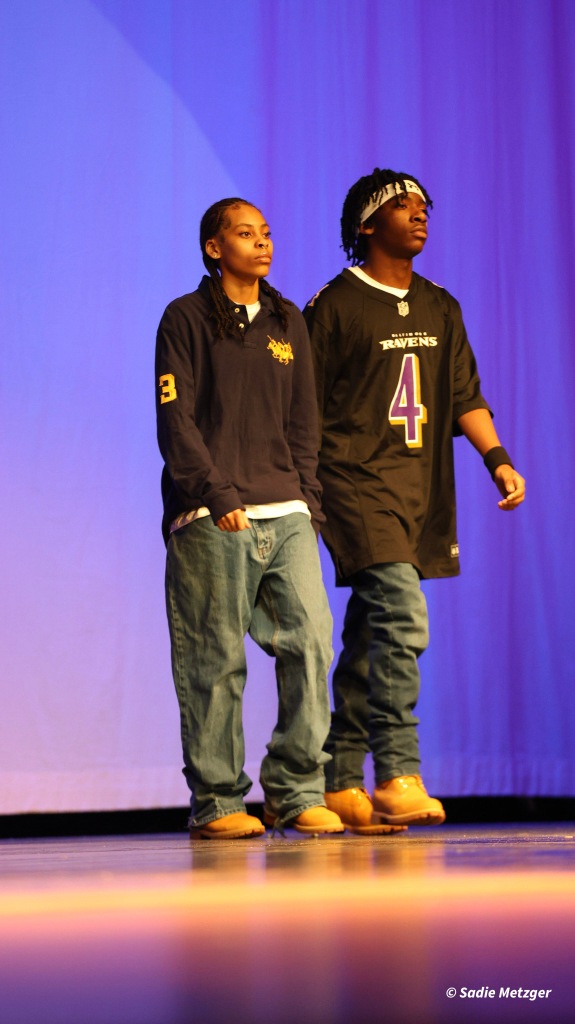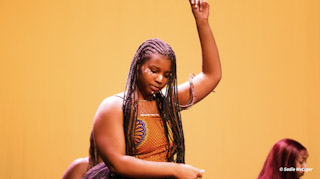We are Art.

A look back at a throwback( picture was taken at Clarksburg High school’s black History month assembly, showcasing the art of African Americans. and the popular style of the 1990)

Fashion at its finest. (picture was taken at Clarksburg High school’s black History month assembly, showcasing the art of African Americans and the popular style of the 90’s-2010’s.)
Spiro – (a piece of art created by clarksburg highschools very own Elona Degoh

Black out Poem
(A black out poem by Jordan Oku inspired by J.Cole’s “heavens Ep”)
“tune your hearts whether or not that truth is hard, switch gears with a new velocity. God runnin me awkwardly, keeping a young family celebrity to an area that’s raw. provin no passion makes that impossible.”

The Literary Affirmation of Black Identity and History
Spoken Word by Ariel Ellis
The past is painful, the present is precarious, and the future is free. I
heard this quote and thought, how does this apply to me? You see my
color; in this world, it defines who I am, as you believe you foresee the
person I am or will become to be. When I see my skin, I know of my past,
but not of my history, for the history I am taught is not all-encompassing
of the present. My people lived and fought for me to be able to stand on
school grounds, grounds of slavery, and to speak freely about black
history. Much of Western history, America specifically, is grounded in the
image of the precarious nature that comes from teaching America’s past,
long approached as an object to be selective, molded, and gazed upon
from a “self-quoted” superior eye. It may seem paradoxical that teaching
America’s history, traditionally viewed as dismal, is actually focused on
the opposite. A closer look reveals that the primary objective of teaching
history is not to dwell on the negative aspects of the past but to learn
from them and improve our present and future. By studying the successes
and failures of our ancestors, we can better understand the challenges we
face today that manifested from their failures and actions. However, you
become addicted to grief, guilt, and hate. But you feel no empathy for
those who went through this insufferable pain. You who feel attacked by
these words, you who feel angered by these words, you are you who I
speak of in this short word today. If what we are taught addresses the
ideal that comes from teaching and not withholding information because
of the fear and unwillingness to come to terms with truth or facts. For
those of us who prefer to remain based in reality, the denialists represent
a conundrum. Black history is an integral part of Western history and
should not be viewed as a separate entity, as it constitutes an essential
aspect that should not be detached from the broader historical narrative;
it is an inseparable part of the historical accounts of all individuals,
regardless of their race, ethnicity, or cultural background. Such an
understanding is crucial in fostering an inclusive and comprehensive
perspective on the past and present. And I know what life is as a black
woman irrespective of one’s ethnicity and race, for we still have to fight
for rights that are anticipated for a man who just had to show his face.
Maybe the reason for enduring the physical pain was to keep living in the
name of atonement for that man’s sins. And for my past is for others their
present, in Kongo, Sudan, and Palestinian land.
(Black history should not be separated or denied. It is essential to know and understand the past struggles and achievements of Black individuals to build an inclusive understanding and view on the present. Despite enduring physical pain and ongoing fights, black women continue to preserve. Their resilience serves as a reminder that their past experiences are still seen in present challenges. )
